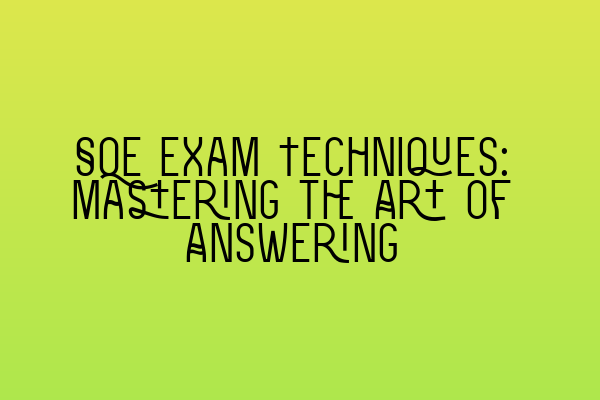SQE Exam Techniques: Mastering the Art of Answering
Preparing for the SQE exams requires not only a solid understanding of the law but also the ability to effectively answer exam questions. In this blog post, we will explore some helpful techniques that will enable you to master the art of answering SQE exam questions and increase your chances of success.
1. Understand the Question
The first step in answering any exam question is to thoroughly understand what is being asked. Read the question carefully, identify the key issues, and underline or highlight any important information. This will help you stay focused and ensure that your answer addresses all the relevant points.
For example, let’s say the question asks you to discuss the legal implications of a specific land charge. To provide a comprehensive answer, you need to analyze the relevant legal principles, examine any case law, and consider any potential consequences. This not only demonstrates your knowledge but also shows your ability to apply the law to practical scenarios.
2. Plan Your Answer
Before diving into your answer, take a few moments to plan your response. This will help you organize your thoughts and ensure that you cover all the necessary points. Outline the main arguments or issues you want to address and allocate some time for each. This step is crucial, as it helps you avoid rambling or missing important information.
For instance, if the question requires you to discuss landlord responsibilities in the UK, you might want to cover topics such as repairs and maintenance, safety regulations, and tenant rights. By planning your answer, you can allocate sufficient time to each of these areas and provide a well-rounded response.
3. Structure Your Answer
In addition to planning, proper structuring is key to presenting your answer in a clear and logical manner. Begin with a concise introduction that outlines the main issues and your overall stance. This sets the tone for your response and helps the examiner understand your approach.
Next, move on to the main body of your answer. Divide it into paragraphs, each focusing on a specific point or argument. Start each paragraph with a clear topic sentence and provide supporting evidence or examples to reinforce your statements. Remember to link your arguments back to the question to demonstrate relevance.
Finally, conclude your answer by summarizing your main points and restating your position. This gives your response a sense of closure and leaves a lasting impression on the examiner.
4. Use Legal Terminology
When answering SQE exam questions, it is vital to use appropriate legal terminology. This not only demonstrates your understanding of the subject matter but also enhances the professionalism and credibility of your answer.
For example, instead of saying “the landlord has to fix any issues,” use phrases like “the landlord has an obligation to carry out repairs in accordance with Section X of the Landlord and Tenant Act.” Using precise legal terms shows that you are well-versed in the relevant legislation and can effectively communicate your ideas.
5. Practice and Review
Like any skill, mastering the art of answering SQE exam questions takes practice. Make use of interactive SQE mock tests to sharpen your skills and become familiar with the exam format. These mock tests not only allow you to assess your knowledge but also help develop time management strategies, which are crucial during the actual exams.
After completing a practice exam or mock test, take the time to review your answers. Identify any areas where you may have made mistakes or missed important points. By doing so, you can learn from your errors and improve your performance in future exams.
Conclusion
Answering SQE exam questions effectively requires a combination of knowledge, preparation, and strategic thinking. By understanding the question, planning your answer, structuring your response, using legal terminology, and practicing regularly, you can increase your chances of success in the exams. Remember to stay focused, remain calm, and trust in your abilities. Good luck!
Related Articles:
- Key Topics in SQE Land Law: A Roadmap to Exam Success
- SQE Prep: Essential Tips and Resources for Success in Property Practice
- Examining Land Charges: Implications and Considerations
- Understanding Landlord Responsibilities in the UK: Legal Obligations Explained
- Interactive SQE Mock Tests for Property: Sharpen Your Skills for Exam Success

Leave a Reply